About Oregon Tradeswomen
C2P2: Building a Stronger, More Inclusive Construction Workforce
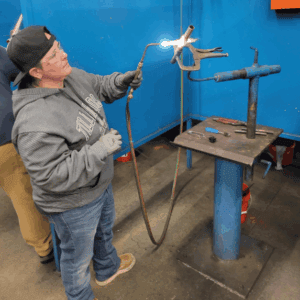 A strong and diverse workforce is essential to building healthy, resilient communities, and Oregon Tradeswomen is proud to be part of the regional collaboration making that vision a reality.
A strong and diverse workforce is essential to building healthy, resilient communities, and Oregon Tradeswomen is proud to be part of the regional collaboration making that vision a reality.
Across the greater Portland area, demand for skilled tradesworkers is on the rise. Over the next decade, 22,000 construction jobs are expected to open as major public infrastructure projects move forward. Yet, the workforce is shrinking and aging… 22% of current workers are nearing retirement, while only 8% of new workers are under 25. At the same time, many aspiring tradespeople face barriers to entering and staying in the field, from access to affordable and reliable childcare and transportation, to jobsite harassment and limited mentorship opportunities.
Led by local public agencies who have made policy commitments, and supported by organizations like Oregon Tradeswomen, Construction Career Pathways (C2P2) is a regional strategy to grow and diversify the construction workforce. By investing in pre-apprenticeship training, apprenticeship access, and on-the-job retention supports, this collaborative effort is ensuring that women and BIPOC job-seekers have equitable opportunities to build rewarding, family-wage careers in the trades.
At Oregon Tradeswomen, we see every day how breaking down these barriers changes lives, not just for individual workers, but for families and communities across our region. When more people can succeed in the trades, we all benefit from stronger infrastructure, greater economic resilience, and a workforce that reflects the diversity of our community.
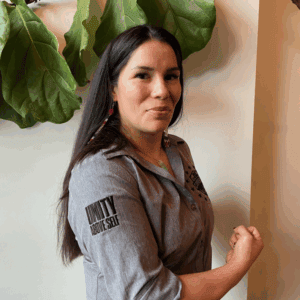
Metro Regional Government’s new Construction Careers Pathways Regional Dashboard highlights the real impact of these efforts, including hard data and compelling stories demonstrating the progress being made to build a better future for all workers. You can also discover active and completed public projects impacted by these efforts.
Visit the dashboard to learn more about how Oregon Tradeswomen and our partners are helping to shape a strong, inclusive, and sustainable construction industry for our region’s future.
OTW Pre-Apprentices at Habitat for Community Build Day
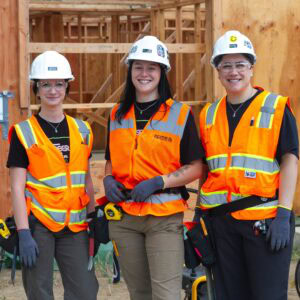
This September, three Oregon Tradeswomen pre-apprentices from the Summer 2025 TACC cohort were given the opportunity to participate in a Community Build Day at Habitat for Humanity‘s Myrtlewood Way job-site in Gresham alongside pre-apprentices from Constructing Hope. This Community Build Day was hosted by our friends at Danner Boots with the goal of highlighting young tradesworkers, also known as “the Toolbelt Generation,” in hopes of inspiring Gen-Z and Gen-Alpha youth to consider careers in the skilled trades. Skilled trades careers offer high wages and many diverse career pathways that are accessible to anyone ready to work hard, as well as high levels of career satisfaction.
Our pre-apprentices Ella, Jess, and Bre spent the day working shoulder-to-shoulder with skilled Habitat tradesworkers in addition to other pre-apprentices, learning new carpentry techniques and building upon the foundation that they have formed throughout their time in the TACC program. This experience gave these three students a taste of what their future could look like, building their communities alongside a solid team of tradesworkers, and left them excited for what is to come after they complete their pre-apprenticeship.
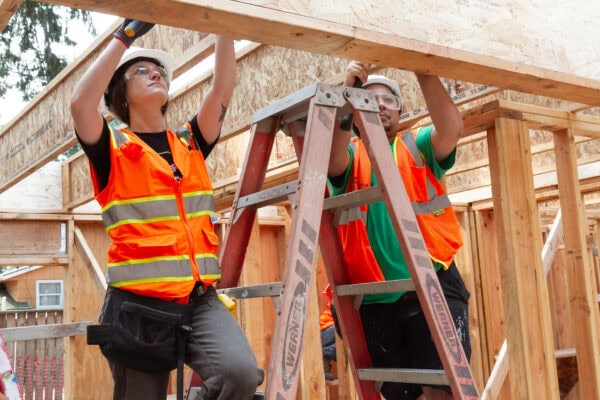
There are many opportunities to get involved and develop your building skills like our three pre-apprentices did. If you are looking to skill-up while contributing your time to a great cause, Habitat for Humanity is looking for more volunteers for the Myrtlewood job-site. Learn more about volunteering with Habitat here!
Oregon Tradeswomen is Made For This
Made For This is a new initiative coming from KGW, Portland’s local NBC channel, that aims to highlight career options in the skilled trades! After decades of societal messaging that reinforces the idea that going to college is the only way to start a good career, KGW is working to change that narrative by promoting alternative pathways to meaningful careers such as pre-apprenticeship and registered apprenticeship. These career pathways offer transferable skills, paid on-the-job training, and come without the burden of college debt.
Through a partnership with Oregon’s Bureau of Labor and Industry (BOLI) and the Oregon Department of Transportation (ODOT), Oregon Tradeswomen was given the spotlight to feature our Trades and Apprenticeship Career Class (TACC) and one of our successful pre-apprenticeship graduates for Made For This.
Our first venture with Made For This was a promotional video that featured union Laborer with LiUNA Local 737 Kaysha Yarnell. Kaysha is an Oregon Tradeswomen graduate who recently completed her apprenticeship with LiUNA. We had a lot of fun filming Kaysha at the Laborer’s Training Center as she works alongside her fellow Laborers. Watch Kaysha’s video…
Oregon Tradeswomen staff was also invited to join host Lacey Evans on Hello Rose City, KGW’s morning show highlighting the latest trends in Oregon and SW Washington. Our Training Manager Zoe Stansbury and Admissions Coordinator Elle Madison went live on August 21st to spread the word about Oregon Tradeswomen’s TACC program and how TACC can help women jumpstart their careers in the skilled trades. Check out Oregon Tradeswomen on Hello Rose City…
We are so grateful to BOLI, ODOT, and KGW for the opportunity to highlight the work we do at Oregon Tradeswomen and give visibility to women in the trades. With this industry being disproportionately male-dominated, every ounce of representation makes a huge difference to show that women are Made For This!
Introducing New Leadership at Oregon Tradeswomen

Oregon Tradeswomen is excited to announce the appointment of Courtney Hamilton as our new Executive Director. With over 10 years of non-profit management experience and a PhD in Behavioral Health, Hamilton is poised to drive the organization into a refreshing new chapter in 2025. Hamilton has been working with Oregon Tradeswomen for the past year, redeveloping systems and processes to improve the Pathways to Success program and its outcomes. Prior to joining Oregon Tradeswomen, Hamilton’s work centered around serving women experiencing homelessness and women re-entering society after incarceration. Over her career, Hamilton has demonstrated an unwavering commitment to creating and sustaining healthy work environments and providing the support necessary to help women transform their lives for the better.
2025 marks a pivotal moment for us as we look to build on the tremendous work of the organization’s last 35 years. Hamilton assures that “We stand committed to our legacy of providing training, mentorship, and advocacy for women in the trades, while also developing a highly skilled workforce that continues to build communities across our state.” Oregon Tradeswomen looks forward to engaging in deep collaboration with community, industry, and union partners to ensure women have access to life-changing career opportunities in the skilled trades industries.
Looking forward to the year ahead, we are energized to continue delivering our programs and services, centering around workforce development and advocacy efforts. Oregon Tradeswomen remains focused on creating pathways for women to enter and succeed in high-wage, high-demand careers in the trades, and to foster an environment where they can thrive. We are looking forward to continuing work with the Safe From Hate Alliance at the annual Safe From Hate Summit on April 11th, as well as introducing thousands of students and job-seekers to careers in the skilled trades at Oregon Tradeswomen’s 30th annual Career Fair on May 16th and 17th.
“We are excited about the future, and under Courtney’s leadership, we will continue to build upon our successes and increase our impact across Oregon,” says Nami Bigos, Deputy Director. “Together, we can ensure that women have the tools, resources, and support they need to create a brighter future for themselves and the communities they build.”
Oregon Tradeswomen is a Union Shop!
We are pleased to announce that Oregon Tradeswomen is a union shop! In February of 2023, the staff at Oregon Tradeswomen came together to organize under the International Association of Machinists and Aerospace Workers (IAM) Local Lodge 63. By the end of 2023, a collective bargaining agreement was reached that serves the needs of both staff and the organization.
In our nearly 35 years as an organization, Oregon Tradeswomen has been driven by our mission to empower women to break barriers and thrive in the traditionally male-dominated construction trades. Not only does that entail providing training and career support, but that all workers, Oregon Tradeswomen graduates or not, are treated fairly and have a voice in the workplace.

Oregon Tradeswomen’s Bargaining Team with their contract!
Through the ups and downs of the bargaining process, we have committed to these values, ultimately ensuring that our workers have a seat at the table in how Oregon Tradeswomen moves forward as an organization. Starting in January 2024, Oregon Tradeswomen’s first union contract took effect, establishing a 4-day work week and securing competitive wages and benefits for staff as they work hard to serve the community. In the spirit of collaboration, the contract also established an Ad Hoc Committee comprised of staff, management, and subject matter experts to discuss how Oregon Tradeswomen moves forward regarding organizational structure, and staff roles and responsibilities. The Ad Hoc Committee met regularly and, by the end of March, successfully produced recommendations put into action by Oregon Tradeswomen’s management team, including a plan to hire the staff power needed to achieve our common goals and further our mission.
This milestone is exciting for us as an organization that supports the good work of unions in the skilled trades, as well as the work of the labor movement that is in the midst of a much-needed resurgence. Through some solid teamwork between the union and management, Oregon Tradeswomen can proudly declare that we are a union shop! Stay tuned for more updates as we continue to pave the way for a brighter, more equitable future in the skilled trades. Together, we are forging a stronger, more united Oregon Tradeswomen!
Statewide Expansion Reaches Lane County
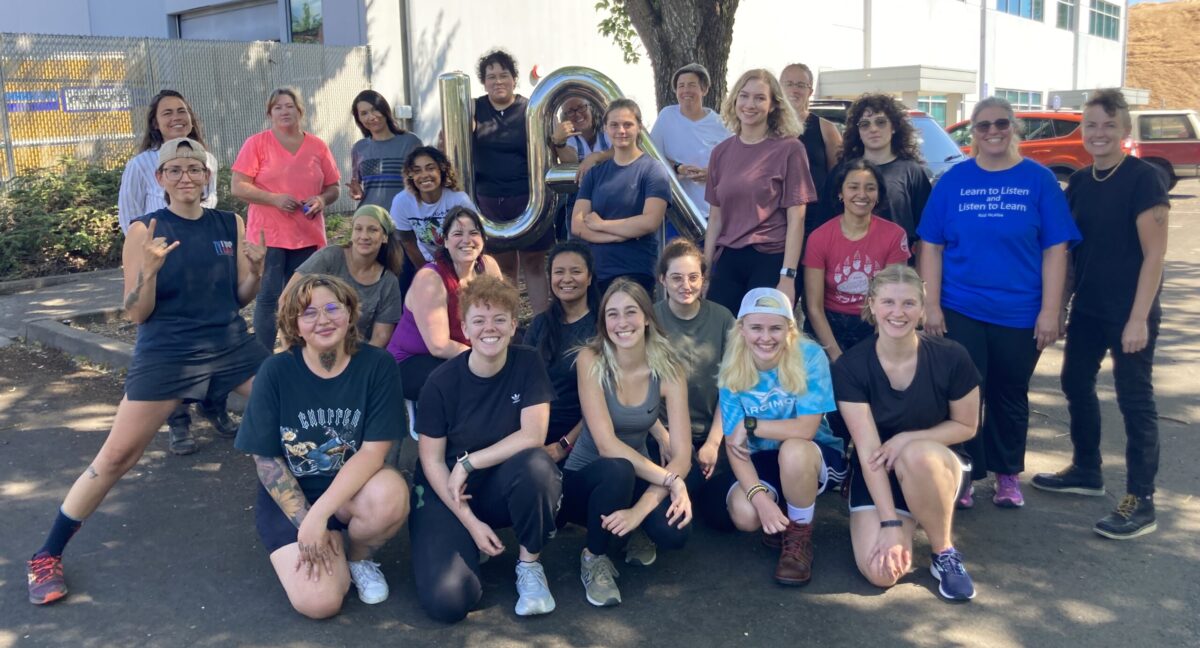
Oregon Tradeswomen continues to expand our pre-apprenticeship training opportunity for women to new communities in Oregon. Our incredible team, and a host of industry partners and supporters, worked hard to bring our Trades and Apprenticeship Career Class (TACC) to Lane County this summer. It’s our largest cohort of students outside of the Portland Metro area so far!
Excited doesn’t even begin to capture our feelings about offering our BOLI-certified pre-apprenticeship training program to even more women and gender minorities across the state of Oregon. Over the 8-weeks of training, these students will be hard at work preparing to take the next step into registered Apprenticeship and a career in the skilled trades!
This new venture would not be possible without the dedication and support of our many partners who helped us get here. Huge gratitude to UA Local 290, for our ongoing partnership, and for hosting our Summer TACC at their state-of-the-art training center in Springfield, Oregon. This cohort of pre-apprentices have a wonderful facility to build a strong foundation of skills and knowledge necessary to succeed in their chosen career in construction.
Oregon Tradeswomen was also thrilled to work with Terry Bierwirth of Second Story Marketing Group to get the word out about our first Lane County training opportunity. Our team first met Terry many years ago as part of her Skilled to Work campaign on KEZI in Eugene. With Second Story Marketing Group as our partner, we were able to recruit the most students we’ve ever had in a statewide pre-apprenticeship offering!
We extend our most sincere thanks to:
Area III Plumbers JATC
Balanced Electric Inc.
Chambers Construction
Connected Lane County
Eugene Builders Exchange
Independent Electrical Contractors Oregon
Lane Education Service District
Lane Workforce Partnership
NAWIC Eugene Chapter #77
Opportunity Oregon
Oregon Employment Department
Pacific Northwest Carpenters Institute
Sheet Metal Institute
Springfield Chamber of Commerce
UA Local 290 College of Mechanical Systems & Technology
WorkSource Oregon Lane
Each of these organizations helped share information about Oregon Tradeswomen’s TAC Class with their networks and community, and a sound reminder of how our collective efforts around a common goal can achieve great things, and that together, we are moving the construction industry into a bright future.
We can’t wait to see the Summer cohort of pre-apprentices develop into skilled tradesworkers who will be building across Oregon!
Executive Director Transition Update
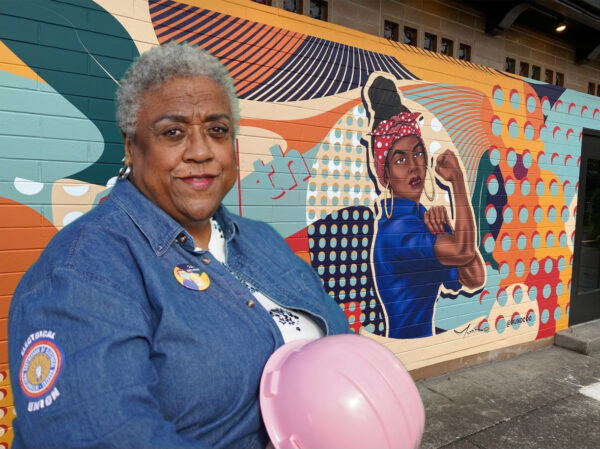
Donna Hammond in front of the mural at Amalfi’s restaurant.
When Kelly Kupcak, Oregon Tradeswomen’s 2nd ever Executive Director, announced to our Board of Directors that she needed to return home to Ohio to be in closer proximity to her family and aging father, the Board rallied and worked with a consultant to determine the best next steps for the organization.
Now entering our 34th year as a nonprofit, Oregon Tradeswomen (OTW) is excited to share that a founding member, former Board of Directors Treasurer, and tradeswoman pioneer, Donna Hammond, has stepped in to serve as Interim Executive Director.
Under Kelly’s leadership, Oregon Tradeswomen made strides to expand opportunities for Oregonians. Our organization was able to level-up and secure our own workshop to run our program in-house for the first time in our history.
Oregon Tradeswomen also began expanding state-wide to provide crucial career education to women and non-binary individuals living in rural communities. Oregon Tradeswomen now serves more BIPOC students than ever before, hand-in-hand with the implementation of the Helen Getchell Women of Color Fund to provide specific support to BIPOC tradeswomen+.
Almost all people served through our pre-apprenticeship program, the Trades and Apprenticeship Career Class, report having a low-income and are looking to leave poverty behind. Because of Kelly’s leadership, we removed an additional barrier to attending our class class by providing all students with a $15/hr wage equivalency during training. In a groundbreaking move, Oregon Tradeswomen also successfully launched a direct-entry pipeline from our pre-apprenticeship training to the International Brotherhood of Electrical Workers Local 48 and United Association Local 290 Plumbers, Steamfitters, HVAC/R, and Marine Pipefitters apprenticeship programs, supporting the high job-placement of our Trades and Apprenticeship Career Class graduates!
Over the past 6 years, Oregon Tradeswomen’s work has grown to encompass more advocacy efforts to improve the experiences of non-traditional tradesworkers on the jobsite. Oregon Tradeswomen made great efforts to increase retention of women in the trades through the implementation of a job-site culture change program called RISE Up– and is an affiliate trainer of this program. Today, more than 700 employees at 15 different organizations have already completed training and we are working with another 10 organizations to implement RISE Up on their job-sites.
This initiative strongly compliments the work done with the Safe From Hate Alliance and the Tradesworker Equity Council, engaging both industry partners and diverse tradesworkers to stand up against racism, sexism, and trans/homophobia in the industry.
Kelly’s leadership also made significant impacts in the legislative sphere as she engaged local, state, and federal policymakers to include funding for pre-apprenticeship programs and initiatives to increase racial and gender diversity and equity in the trades.
Oregon Tradeswomen’s founding Executive Director, Connie Ashbrook, reflected on the change, saying, “As the founder of Oregon Tradeswomen and longtime colleague of Kelly Kupcak, I am so proud and appreciative to see the growth and expansion of Oregon Tradeswomen that she has led over the last six years since I retired… I am excited to see what is next for Oregon Tradeswomen that will be made possible because of the work accomplished under her leadership.”
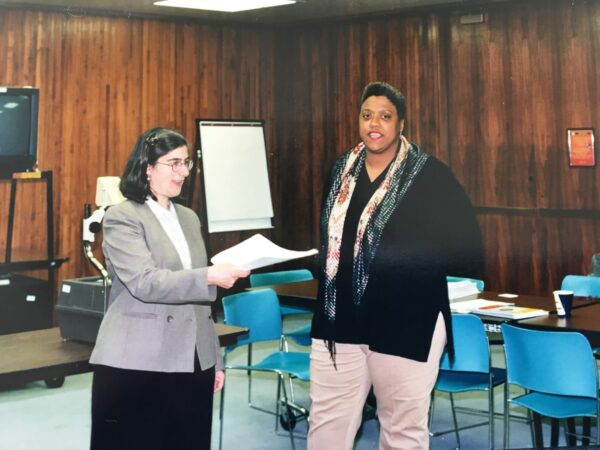
Connie Ashbrook (left) with Donna Hammond (right) in Washington DC
As Donna Hammond assumes leadership of OTW as it’s 3rd ever Executive Director, she shared, “It is an honor for me to serve as the Interim Executive Director. I’ll be working alongside some of the best, brightest, and most passionate individuals in the construction industry who share a commitment to pre-apprenticeships. My goal is to build upon Oregon Tradeswomen’s success while continuing to expand and support the pathways of competent applicants to meet tomorrow’s construction needs.”
Oregon Tradeswomen is fortunate to have Donna’s lived experience, long history with the organization, and commitment to this work and mission. Change is never easy, but passing the torch to Donna Hammond will surely build upon our organization’s strong foundation as we continue to serve women, non-binary, and trans individuals on their pathways to prosperity.
Oregon Tradeswomen’s Summer Night and Weekend Training
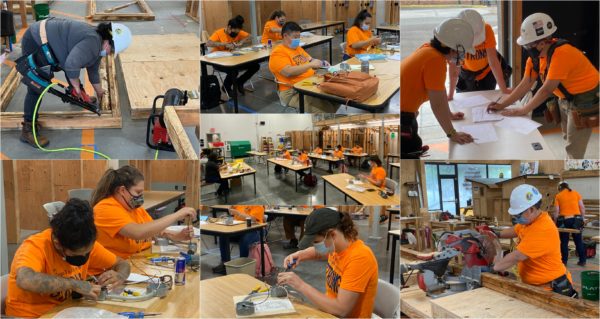
Oregon Tradeswomen recognizes the need to provide options to working women to participate in our programs. Many of our Trades and Apprenticeship Career Class (TACC) pre-apprentices are not only juggling family demands, but working while attending the program. In fact, many join while employed full time and have to give up employment in order to attend. To help these students achieve their career goals while financially sustaining their families, Oregon Tradeswomen responded by offering a night and weekend TACC class this Summer.
Here are some of the participants’ accomplishments observed so far, thanks to the alternative night and weekend schedule:
- Two TACC participants work full-time jobs during the day and are committed to graduate while preparing for IBEW’s Electrical Apprenticeship.
- A third student is working full-time as a teacher aid while caring for a newborn and a toddler while attending TACC.
- Another participant is able to work part-time, care for her kids, and thanks to the current schedule, her husband can watch the kids in the evenings.
- We also have a participant who is a full-time mom, and is able to leave her kids with their dad in the evenings so that she can attend classes.
Oregon Tradeswomen is able to be responsive to jobseeker needs, and shift our programming with the valuable collaboration of industry partners and we will continue to make our program more accessible. Look for additional evening and weekend classes in 2022!
Social Hour Connections
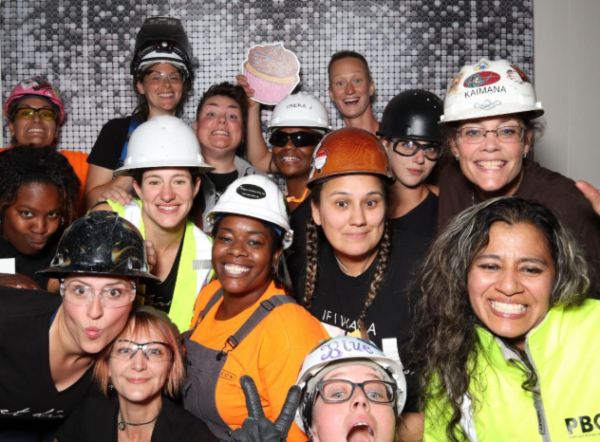
Oregon Tradeswomen has offered Monthly Social Hours for years as a way for tradeswomen to connect with each other and provide educational experiences through topics and guest speakers. As a tradeswoman, it is commonplace to be the only woman on a jobsite, and the opportunity to connect with other women in the trades is such an important aspect for the retention of women in construction careers.
When the COVID-19 pandemic impacted us last year, our Retention Services Coordinator, Kim Neel, knew it was more important than ever to offer a way for tradeswomen to continue to have an opportunity for support and socializing. With that, OTWednesdays was created, a virtual Social Hour taking place on the third Wednesday of every month!
Unlike past Social Hours, OTWednesdays is more of an open format, with no topics or guest speakers, just pure connection between tradesworkers of all ages and experiences. There is something so special about seeing the mentorship between veteran tradeswomen and those who are just getting started on their paths with the sharing of stories, advice on surviving apprenticeship, and tips on how to earn the respect of their male peers. At a recent social hour, we had a tile-setter named Joanne who had been in her trade since the 1980’s who generously answered questions from some upcoming pre-apprenticeship students who were excited about their new careers, but a little nervous about what to expect. From advice on what PPE (personal protective equipment) to invest in to how to approach learning a new tool, the exchange of information was inspiring to witness and it was clear that the novice tradesworkers there took Joanne’s advice to heart.
A unique aspect of our virtual format is that other supporters of tradeswomen can join in to connect and learn. Sometimes industry partners join to provide opportunities to tradeswomen to advance their careers, offering a foot in the door for elevated positions like Construction Inspector or Surveyor. We have even been joined by regional legislators like Sue Chew, Idaho State Representative District 17, who want to learn more about tradeswomen issues as well as provide resources for professional development opportunities. We are grateful for those in our industry and those who are supporters of the tradeswomen movement for their commitment and involvement.
As the pandemic begins to wind down and we look to the future for what is on our horizon, we are evaluating how to best offer support to tradeswomen. While we cannot wait to host Social Hours in our own building, we have seen the value of providing a virtual space for tradeswomen and their supporters to gather and collaborate. Many tradeswomen are tired after a long day of hard work and to have to go home, change out of their work gear, and head out to a social gathering is not always easy. But, to be able to settle in to a comfy chair after work and simply log in to Zoom, the opportunity to socialize is available to a wider community of tradesworkers and their supporters!
The connection between tradeswomen is so valuable, and our goal is to offer easy access to a supportive community that can provide advice and camaraderie. Being a tradeswoman is a unique experience and the hurdles that can come with it can become more manageable when there is a place for others with similar experiences to gather and socialize.
2021 DJC Building Diversity Awards

- GeoEngineers
- Todd Duwe, Perlo Construction
- Meyer Memorial Trust headquarters project
- Mel Jones, JE Dunn Construction
- Román Hernández, Troutman Pepper
- Kelly Kupcak, Oregon Tradeswomen Inc.
- Wenaha Group
- Portland Building reconstruction project
- RKm Development
- The Skanner (lifetime achievement award)
- Center for Equity & Inclusion
- Advanced Tribal LLC
- Hacienda Community Development Corp.
- Angela Watkins, Minority Construction Group and Constructing Hope
- NAMC University
- Safe from Hate initiative
